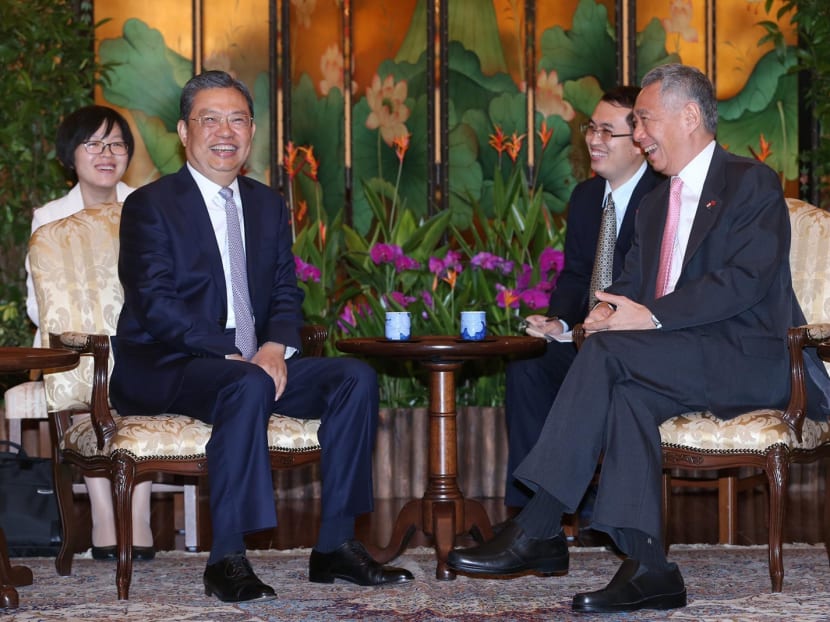Deep ties can help Singapore, China tackle common issues: DPM Teo
SINGAPORE — Although Singapore and China are different in size, they face common challenges in innovation and governance, noted Deputy Prime Minister Teo Chee Hean yesterday as he kicked off a high-level bilateral forum on leadership.

Mr Zhao (left) and PM Lee affirmed both countries’ strong and substantial relationship when they met at the Istana yesterday. Mr Zhao was in Singapore for the 6th China-Singapore Forum on Leadership. Photo: Wee Teck Hian
SINGAPORE — Although Singapore and China are different in size, they face common challenges in innovation and governance, noted Deputy Prime Minister Teo Chee Hean yesterday as he kicked off a high-level bilateral forum on leadership.
Delivering the keynote address during the 6th China-Singapore Forum on Leadership, Mr Teo said the common obstacles faced by both countries included an ageing population, a slower-growing workforce, rising expectations of a well-educated younger generation and the impact of technology on society, among others. The theme of the forum is “Leadership Development for National Innovation”.
“It is an issue of great relevance to Singapore and China as we face new challenges in our current phases of development,” said Mr Teo, to an audience of around 100 people. “The ability to have a wide-ranging and substantive discussion on such issues of national interest reflects the high degree of mutual trust between Singapore and China, as well as the depth, breadth and strength of our bilateral ties.”
During the forum, which was also attended by Mr Zhao Leji, Member of the Political Bureau and Minister of the Organisation Department of the Communist Party of China (CPC) Central Committee, Mr Teo shared key strategies in Singapore’s national innovation journey. The Deputy Prime Minister noted that Singapore has always taken the long-term view in developing policies, while being prepared to adapt and improve them along the way.
Citing the example of water management, Mr Teo recounted that after Singapore’s independence, it remained almost entirely dependent on imported water from Malaysia. But the Republic managed to gradually reduce this dependence using a variety of measures, including trying bold ideas such as using recycled NEWater.
He said Singapore’s experience in water management came in useful during the Tianjin Eco-City project.
“Singapore companies can, in turn, learn from China’s experience in the field of renewable energy, in which Chinese clean-tech companies are now global players,” he said.
On his part, Mr Zhao said during his keynote address that developing a model of socialism with Chinese characteristics is central to the country’s governance strategy.
“Since the party’s 18th congress in 2012, under the leadership of the party central committee with Mr Xi Jinping at the core, we have made it our general goal to improve and develop socialism with Chinese characteristics, (modernising) China’s governance system and its capacity for governance,” he said.
“We have been deepening innovation in theory, practice, systems, culture and in other areas in order to give great impetus to achieving the two centenary goals (of doubling China’s 2010 per capita GDP by 2021 for both urban and rural people, as well as creating a ‘prosperous’ nation that ‘reaches the level of moderately developed countries’ by 2049).”
Earlier in the day, Mr Zhao visited the Lee Kuan Yew School of Public Policy to better understand Singapore’s training programmes on human resource development.
After the forum, he called on Prime Minister Lee Hsien Loong. Both leaders “affirmed the strong and substantial relationship between Singapore and China”, said Ms Chang Li Lin, Mr Lee’s press secretary.
“The two leaders noted that bilateral relations dated back to 1976, when then-Prime Minister Lee Kuan Yew first visited China, and 1978, when then-PRC (People’s Republic of China) Vice-Premier Deng Xiaoping visited Singapore. Mr Lee and Mr Deng provided a strong foundation for the friendship and cooperation that the two countries now enjoy,” she added.
PM Lee and Mr Zhao agreed that human resource development has become an important area of bilateral cooperation, said Ms Chang, adding that Mr Zhao also expressed appreciation for Singapore’s participation at the Belt and Road summit in Beijing earlier this week. Mr Zhao later also visited Punggol town.
Sino-Singapore ties are long-standing and broad-based. Singapore is China’s top source of foreign investments, while the latter is the Republic’s biggest trading partner.
At the forum, Minister for Education (Higher Education and Skills) & Second Minister for Defence Ong Ye Kung, as well as Vice-Minister of the Organisation Department of the CPC Central Committee Gao Xuanmin, also delivered thematic speeches.
Mr Ong said Singapore’s scale of development may be small, but it is similar to China’s in terms of objectives and train of thought. “In Singapore, we have a majority Chinese population. But other than the Chinese traditional culture, what is very deeply rooted in Singapore is a collective awareness that there is also the tradition and wisdom of the Malay and Indian cultures,” he added. “We are small, and we are open. We have been very much affected by Western cultures, but basically, we are still an Eastern society.”









